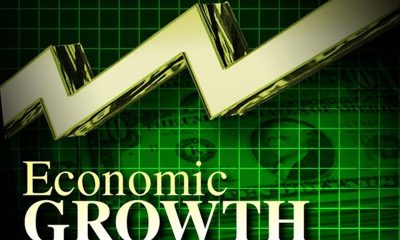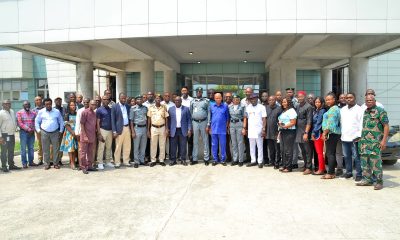Economy
FBNQuest Sees Education as Catalyst for Economic Growth

Across the globe, organisations have intensified efforts towards preparing their workforce for the demands of the future.
The preparation comes in the form of education (or training), that is, upskilling (technical, soft skills, mentorship) and digitisation training programs which will avail workers the ability to acquire knowledge, skills, tools and the ability to use the ever-changing technologies in their workplaces and private affairs.
As a critical component of a country’s human capital, evidence abounds as justifications for investing in educating the workforce: a leading determinant of economic growth, employment, and earnings.
The need for education in all its form cannot be overemphasised in this rapidly changing world. For instance, 2020 in retrospect, particularly between the second (Q2) and third quarter (Q3), have it that the global economy witnessed a significant amount of disruption.
From SMEs to big corporations, economic activities were at a standstill. Despite the technological advancement of the Organisation for Economic Co-operation and Development (OECD) countries, the tale was not palatable.
The world’s biggest economy, the United States, was not left out as its economy plunged by 31.4 per cent within the period. The Eurozone witnessed a 12.1 per cent decline in its real GDP growth rate by the same period, and the impacted some economies within the Euro area.
Spain’s real GDP growth rate declined by 18.5 per cent; France’s fell by 13.8 per cent, Italy saw its real GDP decline by 12.4 per cent, while Germany’s sank by 10.1 per cent.
Further, some countries including Africa’s biggest economy, Nigeria, slumped into recession. This spiralled into a significant amount of job loss across every sector of the economy, not leaving the western world behind.
As a bounce back, education took its role leading to inventions and innovations. The lockdown forced companies and businesses to think outside the box for a quick fix—upskilling their workforce. Consequently, companies in Nigeria began to train their workforce to adopt digital means of doing business which then led to remote working as part of the new normal.
In effect, technology came atop as one of the catalysts that individuals, firms and government turned to inject life into their businesses and other activities.
From virtual meetings to online learning, mobile technology and online support for offline sectors, governments and corporate bodies switched to the new normal. Apps like Zoom, Google Meet, GoToMeeting, Join Me, Webex, Slack and Microsoft Teams to mention a few became a central platform for conferencing.
According to Sensor Tower, the global app revenue jumped to $50 billion in the first half of 2020, representing 26.1 per cent of the corresponding quarter in 2019, and partly due to COVID-19, with Google Play taking the largest chunk of the global revenue.
Although training and capacity building remains a critical pillar in recent times, the process of developing human capital through education requires creating the necessary environment in which employees can learn better, apply innovative ideas, acquire new competencies, develop skills, behaviours and attitudes.
Education can be formal, informal and non-formal with the desire to get improved performance, enhance innovation in new strategies and products, reduce employee turnover, and boost the organisational profiles. This consequently affects the gross domestic product (GDP) of a country. A country’s economy becomes more productive as the proportion of educated workers increases.
Education, through digital technology, has started to transform the lives of smallholder farmers, thus reducing post-harvest losses, by having the means to better storage and processing facilities and access to market information and subsidized farm inputs.
With the introduction of Onecourse, a software application that improves reading, writing and mathematics, the Malawian government was able to narrow the gender gap in reading and mathematics skills. Rwanda implemented a mobile app called Babyl. With this app, patients are given information about their symptoms and referral givens when it becomes unavoidable.
The Nigerian labour force demonstrates the characteristics of individuals who urgently need training such as coding and innovation to be relevant in the 21st-century workplace.
According to the recent labour force data, 30 per cent of Nigerians never attended school. Further analysis shows that 17 per cent had primary school certificates, 36 per cent had secondary school certificates, while those in possession of degree and higher certificates constituted 20 per cent of the nation’s workforce.
Even within this group, 8 per cent have Ordinary National Diploma(OND)/Nigeria Certificate In Education (NCE) certifications; 9 per cent have first degrees (BA/BSc/Bed/HND), while 1 per cent have post-graduate degrees (MSc/MA/MAdmin).
Above this is the 0.1 per cent group which have doctorate degrees. However, according to the Minister of Education, Adamu Adamu, the number of out-of-school children had dropped from 10.1 million in 2019 to 6.5 million in 2020. This shows an intentional effort by parents, governments and organisations to narrow the gap as well as tackle the prevalent challenges, albeit primary education is officially free.
Some organisations envisaged the impact of education/training as a catalyst for Nigeria’s economic growth in Nigeria’s economy. To corroborate this, analysts at Businessday Research and Intelligence Unit (BRIU) understudied the impact of upskilling and digital transformation in driving economic growth in Nigeria.
From the report, it was projected that the Nigerian economy will grow by $8.79 billion by 2023 and this growth will be largely driven by some sectors—ICT, agriculture, health, finance and insurance sectors— and by companies that spend more on training, research and development and technology acquisition.
In this light, FBNQuest, through its Corporate Responsibility and Sustainability (CR&S), continues to focus on knowledge and skills development for economic growth.
Thousands of students have been trained in financial literacy which includes ways to earn, save and grow money; hundreds of women have also been trained on financial literacy through female economic empowerment and capacity building initiatives; A Bloomberg Room was set up in Lagos Business School (LBS) to help students gain access to real-time financial data through the use of the Bloomberg Terminals; employees have volunteered to mentor Teach For Nigeria (TFN) fellows; to mention a few.
Research shows that several present-day jobs may disappear in the next few years, while the jobs of the future are not yet created, requiring that workforces across different sectors need new skills while for firms to remain competitive, digitalisation is the way to go.
In all, it is envisaged that the gross domestic product of many economies will increase noticeably due to the implementation of upskilling and digitisation programs across the world.
Economy
Flour Mills Supports 2026 Paris International Agricultural Show

By Modupe Gbadeyanka
For the second time, Flour Mills of Nigeria Plc is sponsoring the Paris International Agricultural Show (PIAS) as part of its strategies to fortify its ties with France.
The 2026 PIAS kicked off on February 21 and will end on March 1, with about 607,503 visitors, nearly 4,000 animals, and over 1,000 exhibitors in attendance last year, and this year’s programme has already shown signs of being bigger and better.
The theme for this year’s event is Generations Solution. It is to foster knowledge transfer from younger generations and structure processes through which knowledge can be harnessed to drive technological advancement within the global agricultural sector.
In his address on the inaugural day of the Nigerian Pavilion on February 23, the Managing Director for FMN Agro and Director of Strategic Engagement/Stakeholder Relations, Mr Sadiq Usman, said, “At FMN, our mission is Feeding and Enriching Lives Every Day.
“This is a mandate we have fulfilled through decades of economic shifts, rooted in a culture of deep resilience and constant innovation. We support this pavilion because FMN recognises that the next frontier of global Agribusiness lies in high-level technical exchange.
“We thank the France-Nigeria Business Council (FNBC), the organisers of the PIAS, and our fellow members of the Nigerian Pavilion – Dangote, BUA, Zenith, Access, and our partners at Creativo El Matador and Soilless Farm Lab— we are exceedingly pleased to work to showcase the true face of Nigerian commerce.”
Speaking on the invaluable nature of the relationship between Nigeria and France, and the FMN’s commitment to process and product innovation, Mr John G. Coumantaros, stated, “The France – Nigeria relationship is a valuable partnership built on a shared value agenda that fosters remarkable Intercontinental trade growth.
“Also, as an organisation with over six decades of transformational footprint in Nigeria and progressively across the African Continent, FMN has been unwaveringly committed to product and process innovation.
“Therefore, our continuous partnership with France for the success of the Paris International Agricultural Show further buttresses the thriving relationship between both countries.”
PIAS is one of the most widely attended agricultural shows, with thousands of people from across the world in attendance.
Economy
NEITI Backs Tinubu’s Executive Order 9 on Oil Revenue Remittances

By Adedapo Adesanya
Despite reservations from some quarters, the Nigeria Extractive Industries Transparency Initiative (NEITI) has praised President Bola Tinubu’s Executive Order 9, which mandates direct remittances of all government revenues from tax oil, profit oil, profit gas, and royalty oil under Production Sharing Contracts, profit sharing, and risk service contracts straight to the Federation Account.
Issued on February 13, 2026, the order aims to safeguard oil and gas revenues, curb wasteful spending, and eliminate leakages by requiring operators to pay all entitlements directly into the federation account.
NEITI executive secretary, Musa Sarkin Adar, called it “a bold step in ongoing fiscal reforms to improve financial transparency, strengthen accountability, and mobilise resources for citizens’ development,” noting that the directive aligns with Section 162 of Nigeria’s Constitution.
He noted that for 20 years, NEITI has pushed for all government revenues to flow into the Federation Account transparently, calling the move a win.
For instance, in its 2017 report titled Unremitted Funds, Economic Recovery and Oil Sector Reform, NEITI revealed that over $20 billion in due remittances had not reached the government, fueling fiscal woes and prompting high-level reforms.
Mr Adar described the order as a key milestone in Nigeria’s EITI implementation and urged amendments to align it with these reforms.
He affirmed NEITI’s role in the Petroleum Industry Act (PIA) and pledged close collaboration with stakeholders, anti-corruption bodies, and partners to sustain transparent management of Nigeria’s mineral resources.
Meanwhile, others like the Petroleum and Natural Gas Senior Staff Association of Nigeria (PENGASSAN) have kicked against the order, saying it poses a serious threat to the stability of the oil and gas industry, calling it a “direct attack” on the PIA.
Speaking at the union’s National Executive Council (NEC) meeting in Abuja on Tuesday, PENGASSAN President, Mr Festus Osifo, said provisions of the order, particularly the directive to remit 30 per cent of profit oil from Production Sharing Contracts (PSCs) directly to the Federation Account, could destabilise operations at the Nigerian National Petroleum Company (NNPC) Limited.
Mr Osifo firmly dispelled rumours of imminent protests by the union, despite widespread claims that the controversial executive order threatens the livelihoods of 10,000 senior staff workers at NNPC.
He noted, however, that the union had begun engagements with government officials, including the Presidential Implementation Committee, and expressed optimism that common ground would be reached.
Mr Osifo, who also serves as President of the Trade Union Congress (TUC), expressed concerns that diverting the 30 per cent profit oil allocation to the Federation Account Allocation Committee (FAAC), without clearly defining how the statutory management fee would be refunded to NNPC, could affect the salaries of hundreds of PENGASSAN members.
Economy
Dangote Cement Deepens Dominance, Export Activities With $1bn Sinoma Deal

By Aduragbemi Omiyale
To strengthen its domestic market dominance, drive its export activities, optimise existing operational assets and enhance production efficiency and capacity expansion, Dangote Cement Plc has sealed $1 billion strategic agreements with Sinoma International Engineering for cement projects across Africa.
The president of Dangote Industries Limited, the parent firm of Dangote Cement, Mr Aliko Dangote, disclosed that the deal reinforces the company’s long-term growth strategy and aligns with the broader aspirations of the Dangote Group’s Vision 2030.
According to him, Sinoma will construct 12 new projects and expand others for the cement organisation across Africa, helping to achieve 80 million tonnes per annum (MTPA) production capacity by 2030, while supporting the group’s overarching target of generating $100 billion in revenue within the same period.
Under the Strategic Framework Agreement, Sinoma will collaborate with Dangote Cement on the delivery of new plants, brownfield expansions, and modernisation initiatives aimed at strengthening operational performance across key markets.
The new projects include a new integrated line in Northern Nigeria with a satellite grinding unit, a new line in Ethiopia and other projects in Zambia/Zimbabwe, Tanzania, Sierra Leone and Cameroon. In Nigeria, Sinoma will also handle different projects in Itori, Apapa, Lekki, Port Harcourt and Onne.
The projects signal Dangote Cement’s sustained commitment to consolidating its leadership position within the African cement industry, while enhancing its competitiveness on the global stage.
Chairman of the Dangote Cement board, Mr Emmanuel Ikazoboh, during the agreement signing event in Lagos, explained that the new projects would enable the company to play a critical role in actualising Dangote Group’s Vision 2030.
The new projects, when completed, will increase Dangote Cement’s capacity and dominant position in Africa’s cement industry.
On his part, the Managing Director of Dangote Cement, Mr Arvind Pathak, said the agreement reflects the company’s determination to grow its investments across African markets to close supply gaps and support the continent’s infrastructural ambitions.
According to him, Dangote Cement is committed to making Africa fully self‑sufficient in cement production, creating more value and linkages, leading to increased economic activities and a reduction in unemployment.
-

 Feature/OPED6 years ago
Feature/OPED6 years agoDavos was Different this year
-
Travel/Tourism10 years ago
Lagos Seals Western Lodge Hotel In Ikorodu
-

 Showbiz3 years ago
Showbiz3 years agoEstranged Lover Releases Videos of Empress Njamah Bathing
-

 Banking8 years ago
Banking8 years agoSort Codes of GTBank Branches in Nigeria
-

 Economy3 years ago
Economy3 years agoSubsidy Removal: CNG at N130 Per Litre Cheaper Than Petrol—IPMAN
-

 Banking3 years ago
Banking3 years agoSort Codes of UBA Branches in Nigeria
-

 Banking3 years ago
Banking3 years agoFirst Bank Announces Planned Downtime
-

 Sports3 years ago
Sports3 years agoHighest Paid Nigerian Footballer – How Much Do Nigerian Footballers Earn

















